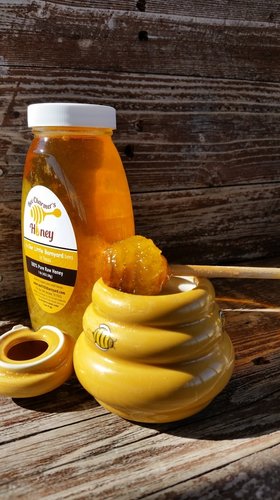 If your honey has crystallized, don't throw it out! It's not bad. Actually, crystallization is a sign of purity, meaning it is a high quality raw honey. "Why does honey crystallize?", you ask. Well, that's a bit of a science lesson. You see, honey is a super-saturated solution of glucose and fructose. It's the glucose that crystallizes. The amount of each type of sugar depends on the food collected by the bees. The higher the amount of glucose, the more crystallization there will be. So the types of sugar in honey depends on what the bees have been eating. Different types of plants have different levels of glucose. Scientist can actually determine what plants the bees have been gathering food from by analyzing the pollen in honey. Honey from plants like clover, maple, tupelo and blackberries have less glucose and therefore crystallizes slower. This same pollen is one of the things that makes honey so great! As many already know, eating local honey can help to reduce your allergies. This is because the pollen in the honey is coming from local plants that are triggering your allergies. A lot of large honey produces put the honey through processes which removes beneficial pollen. Removing the pollen also removes the ability to determine where the honey is from. Some carry it a bit further by blending different types of honey and sometimes using other additives. These processes greatly decrease the nutritional value at the cost of increasing profits, shelf life and making the color clearer and brighter. Crystallization happens faster when there are small particles of pollen to build on. So again, crystallization is a sign of purity in honey because fresh, raw honey has lots of pollen grains! Another factor which causes crystallization is temperature. Even in the hive, honey will crystallize when the temperature is around 50 degrees. So for those of you who enjoy eating honeycomb due to the crunchiness, it's the crunch of honey crystals you are enjoying. Those not so fond of honey crystallization should store their honey in a warm spot to slow down the process of crystallization. Is there anything one can do to remove the crystals? Yes. The best way is to heat the honey slowly by placing your honey container in a bowl of hot water. Microwaving is not recommended as it can heat unevenly or overheat. The best way is to heat only the small portion you currently need and not the entire jar. The down side to all this is, as the honey cools, it will once again crystallize. After trying a few different methods to liquify honey, only for it to crystallize again, I have decided to embrace it in its natural state. Finding peace in the fact that crystallized honey is a sign of its purity, rawness and wholesomeness. Believe it or not, the taste of honey has never been a taste that really excites me. Crystallized honey, on the other hand, is like eating a delicious candy to me! Could eat it by the spoonful! Other uses for crystallized honey is to add it to your tea, yogurt or oatmeal. It's perfect spread on a slice of bread or toasted bagel. Some use it as a spreadable glaze for cooking chicken or stir-fry. Bet it would be great on ham! What ever you do with it, don't waste this delicious food!
0 Comments
Leave a Reply. |
A Mattingly
Artist, Writer, Holistic Living Guide Important Disclaimer: Any content discussing medicinal uses of plants, herbs, or food as medicine is informational only and not prescriptive. When dealing with health issues, be sure to do your own research and consult with the appropriate health professional for guidance. These statements have not been evaluated by the FDA. It is information based on my personal research and studies.
Categories
All
Archives
September 2023
|

 RSS Feed
RSS Feed